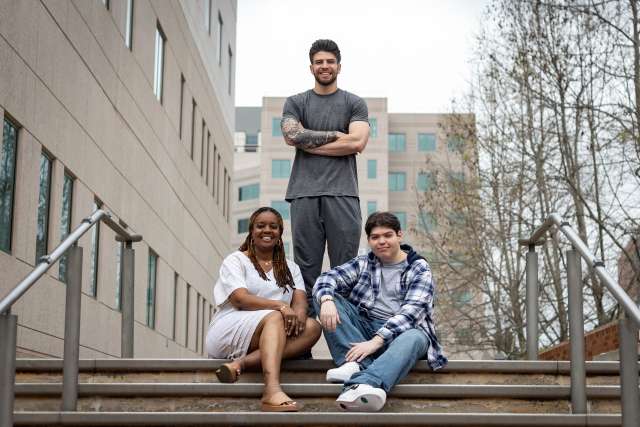Report says lack of support threatens medical advances, nation's health
Flat funding of the National Institutes of Health over the last five years is deterring promising young investigators at UCLA and other major research institutions across the country and threatening the future of Americans' health, according to a new report.
Released today in Washington, D.C., the report by UCLA and a group of five other academic research institutions describes the toll that cumulative stagnant NIH funding is taking on the American medical research enterprise and warns of the consequences of a continued lack of action. If the NIH does not get consistent and robust support in the future, the report concludes, the nation could lose a generation of young investigators to other careers and other countries. With them, a generation of promising research findings that could cure diseases for millions of Americans might be lost.
"Turning off the NIH funding spigot not only slows down potential medical breakthroughs, it discourages some of our finest young medical minds from pursuing careers in academic research," said Dr. Gerald S. Levey, vice chancellor of medical sciences and dean of the David Geffen School of Medicine at UCLA. "While we do the best we can to provide internal support to our young scientists, nothing can replace the gold standard of NIH funding over the long haul."
"A Broken Pipeline? Flat Funding of the NIH Puts a Generation of Science at Risk," profiles 12 junior researchers, including Isla Garraway, M.D., Ph.D., an assistant professor of urology and a member of UCLA's Jonsson Cancer Center who is working to identify markers on stem cells so that they can be used in targeted treatments for prostate cancer, and Michael Rodriguez, M.D., M.P.H., a UCLA associate professor of family medicine who researches the impact of ethnicity and socioeconomic status on health problems. These young scientists, along with others from around the country profiled in the report, describe the funding difficulties they and their professional peers are experiencing.
UCLA co-authored the report with Brown University, Duke University, Harvard University, Ohio State University and Partners Healthcare. The document focuses on the effect that recurring flat funding is having on young investigators in particular. At UCLA, researchers like Garraway and Rodriguez have been forced to postpone or slow down their research on prostate cancer and health care disparities.
"Twenty-four hours a day, seven days a week, you're thinking about your grant proposals and wondering how to survive in this world where fewer people are getting funded and proposals that are funded aren't fully funded or are being cut," Rodriguez said.
And while junior researchers are getting a much smaller piece of the NIH funding pie to conduct their medical investigations, the report says that competition for limited resources is affecting scientists at every point of the academic research pipeline.
Between 1998 and 2003, the Clinton and Bush administrations and Congress doubled the budget of the NIH, an effort that, in many ways, transformed whole fields of biomedical research through major achievements such as the completion of the human genome project. In 2003, however, the budget increases stopped, and since then, the NIH has experienced a 13 percent drop in real purchasing power. President Bush's latest budget proposal calls for another year without an increase.
As a result of curtailed funding, research progress has slowed. New ideas are stuck in a queue where only one in 10 first-submitted grants gets funded. Rejected grants, revised and resubmitted, create a backlog of high-quality research proposals, and young investigators often wait years to receive the funding that would allow them to begin working on their most promising ideas.
Scientists who review NIH proposals have also become more conservative when judging the merits of research projects, inadvertently changing the way science is being conducted, the report says. They are demanding more evidence of the eventual success of proposed theories prior to approving funding and are rejecting ideas that once would have been viewed more favorably. Big and innovative scientific thinking is discouraged in place of safer approaches for incremental progress.
Among the report's highlights of how flat funding is affecting research:
- In 1990, young researchers received 29 percent of R01 grants (the premier NIH research grant needed to establish a researcher's credibility and independence). By 2007, that had dropped to 25 percent.
- While the funding rate has dropped for all R01 applicants, it is particularly low - only 18 percent - for first-time applicants.
- First-time R01 recipients also are older; the average age is now 43, up from 39 in 1990.
"The incredible momentum spurred by researchers at places like UCLA following the doubling of NIH funding in the '90s - a momentum that generated promising research in cancer, strokes, Alzheimer's disease, among others - is already slowing," Levey said. "It's not only a whole cadre of young, enthusiastic scientists' careers at jeopardy if NIH funding does not improve, but discoveries that have the potential to improve the lives of every American."
For copies of "A Broken Pipeline? Flat Funding of the NIH Puts a Generation of Science at Risk" and access to the delayed webcast of today's press conference, visit http://www.brokenpipeline.org/.
UCLA is California's largest university, with an enrollment of nearly 37,000 undergraduate and graduate students. The UCLA College of Letters and Science and the university's 11 professional schools feature renowned faculty and offer more than 300 degree programs and majors. UCLA is a national and international leader in the breadth and quality of its academic, research, health care, cultural, continuing education and athletic programs. Four alumni and five faculty have been awarded the Nobel Prize.



